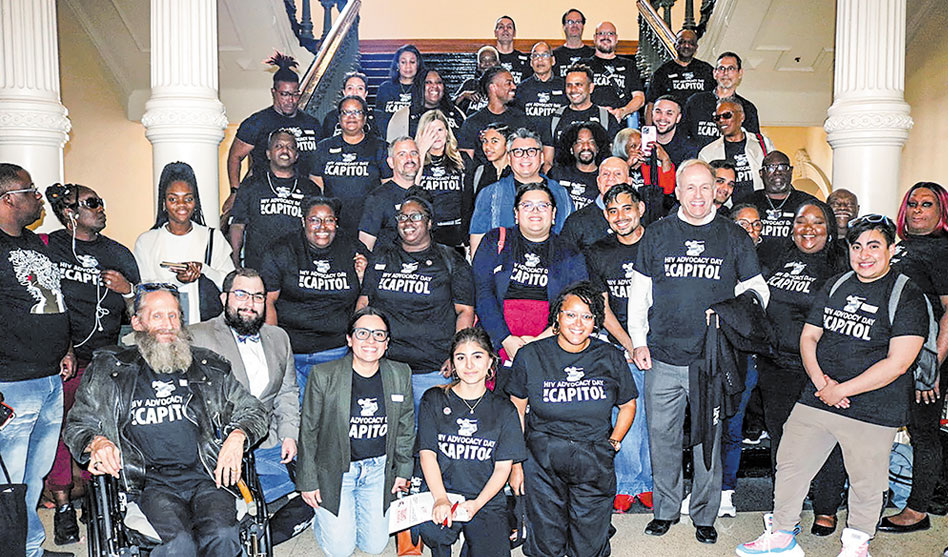HIV/AIDS advocates traveled to Austin Monday to lobby lawmakers
(David Taffet/Dallas Voice)
Speaking to your representatives is an important part of the legislative process
DAVID TAFFET | Senior Staff Writer
taffet@dallasvoice.com
As we waited for state Rep. Raphael Anchia’s legislative aide, Marissa Cummings, we joked about whether we could possibly convince the legislator to support HIV legislation. Anchia, whose district includes portions of Oak Lawn, has always supported — and even sponsored — bills that would help those with HIV and prevention efforts.
When Cummings greeted us, we joked with her about hoping her office would support us, and she laughed. But she also said she wanted any information and stories we had that would help her when she’s talking to staff in other offices about the issue. And as members of the group spoke, Cummings took copious notes.
HIV Advocacy Day took place at the state capital on Monday, March 27. About 100 advocates from around the state gathered in Austin to talk to their legislators or, as happened in most cases, their legislators’ staff members.
The day was organized by the Positive Women’s Network’s Texas Strike Force. Buses from Dallas and Houston and large vans from San Antonio left early enough to arrive in time for breakfast at Austin’s First United Methodist Church, situated a block from the capitol and often used as the staging ground for groups advocating for progressive legislation.
Before going over to the Capitol, the advocates were prepped on how to best get their points across. In the weeks before Advocacy day, most had attended a couple of online training sessions to learn how to advocate.
The first session was “Legislative 101: Understanding Texas Government.” It focused on questions like “How does a bill become a law?” and “How does the Texas Legislature work?”
The second session focused on what to expect when meeting a lawmaker. The emphasis was on telling your own story, and the training stressed that while statistics are important to back up personal stories, lawmakers are often more interested in how the proposed legislation will help real people.
On the morning of Advocacy Day, the training got more specific. Bills that state Rep. Venton Jones had written were explained. Jones, a freshman Democrat from Dallas, is the first Black state representative in the U.S. who is out about his HIV-positive status.
And while the tone stayed mostly positive, Texas Strike Force members who spoke were honest about frustrating setbacks. Recertification, they noted, is a big issue.
The ADAP program — AIDS Drug Assistance Program — requires anyone receiving their HIV meds through the program to be re-certified as needing the assistance every six months. The goal is to change that to once a year in hopes of lowering one of the barriers to treatment.
The change hasn’t been made because the state hasn’t provided funding to implement the change. What’s frustrating is, if implemented, the ADAP program would have half the administrative work to do, saving the system money and saving lives by getting medication to more people.
State Rep. Christian Manuel, one of three new out representatives serving in this legislative session, addressed the advocates. He represents the only majority minority Black district in Texas outside of a major urban area.
Based in Beaumont, Manuel served as chief of staff for his predecessor for 10 years, making him one of the most experienced freshmen in the House. His goal in supporting HIV legislation, he said, is to improve the lives of people living with HIV by reducing stigma and improving the healthcare system especially in rural areas.
Beaumont, he explained, had four hospitals while he was growing up. It’s down to one. Too many other rural parts of the state have no local hospitals at all.
On the topic of stigma, he said he learned something from an aunt who had cancer: “Everyone’s living with something,” she told him.
And that’s his approach to people living with HIV.
“And every person gets one vote,” he said. “Show up.”
He advised those about to go over to the capitol to advocate for HIV legislation to approach the day with the idea that “If you’re not going to vote for us, we’re not going to vote for you.”
After a lunch break, the advocates headed over to the Capitol to hear a House resolution that had passed earlier. Unlike several weeks ago, when Republicans voted down a resolution to welcome the four LGBTQ chambers of commerce to the legislature, only 20 House members voted against welcoming the HIV advocates. So a welcoming resolution passed and became part of the legislative record.
Telling his story
Bruce Wayne traveled on the bus from Dallas to Austin to advocate for the ADAP program. He serves on the Parkland Consumer Advocacy Board, and he told Reps. Carl Sherman from Lancaster and Mihaela Plesa from Plano that when he was diagnosed with HIV, there was no approved medication. So he went to the Dallas
Buyer’s Club and took drugs shipped in from Mexico.
Wayne explained to them that the ADAP program has been funded in Texas so that anyone who needs HIV medication and can’t afford them can get them. That includes someone with insurance that carries high deductibles or large co-pays.
“Please continue the level of funding,” he told the legislative aides. “Today, HIV is easy to treat.”
It’s easy to treat, and treating it is more cost-effective than the emergency room visits and long hospital stays that happen when HIV goes untreated and develops into AIDS.
My group finished the day visiting state Sen. Nathan Johnson’s office. Again, we were meeting with an ally, but Deputy Legislative Director Alvaro Diaz explained he wanted any information we had so Johnson might sponsor the Senate version of Jones’ bills, should they pass the House.

